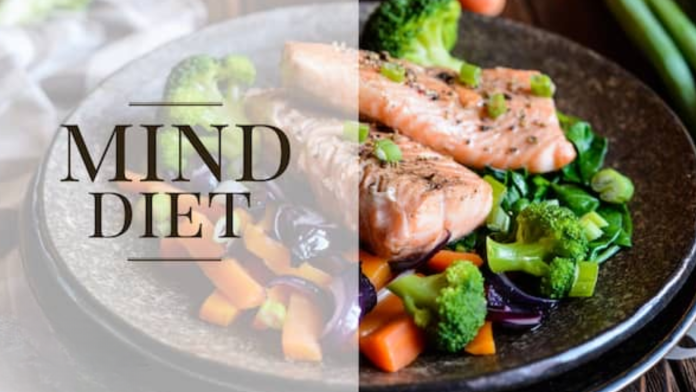As the aging population continues to grow, the prevalence of Alzheimer’s disease, a progressive neurodegenerative disorder, has become a pressing concern. While there is no known cure for Alzheimer’s, research has shown that certain lifestyle factors, including diet, can significantly impact cognitive health. In this article, we will explore the revolutionary MIND diet—a dietary approach designed specifically to promote brain health and reduce the risk of Alzheimer’s disease. With its emphasis on nutrient-rich foods and avoidance of harmful components, the MIND diet offers a practical and accessible way for seniors to proactively support their cognitive function.
Understanding Alzheimer’s Disease:
Before delving into the specifics of the MIND diet, it is essential to understand the basics of Alzheimer’s disease. Alzheimer’s is a progressive brain disorder characterized by memory loss, cognitive decline, and behavioral changes. The exact cause of the disease is not fully understood, but a combination of genetic, environmental, and lifestyle factors is thought to contribute to its development. Research suggests that chronic inflammation, oxidative stress, and the formation of amyloid plaques and neurofibrillary tangles in the brain are central to Alzheimer’s pathology.
The MIND Diet: An Overview
Developed by nutritional epidemiologist Martha Clare Morris and her colleagues at Rush University Medical Center, the MIND diet combines the Mediterranean diet and the DASH (Dietary Approaches to Stop Hypertension) diet, both of which have been associated with a reduced risk of Alzheimer’s. The MIND diet emphasizes specific foods and nutrients that have shown promise in protecting against cognitive decline.
Key Components of the MIND Diet:
- Whole Grains: The MIND diet encourages the consumption of whole grains like brown rice, quinoa, and whole wheat bread. These provide essential nutrients, fiber, and antioxidants that support brain health.
- Leafy Greens and Vegetables: Leafy greens such as kale, spinach, and broccoli are rich in vitamins, minerals, and antioxidants that can help combat inflammation and oxidative stress.
- Berries: Blueberries, strawberries, and other berries are packed with antioxidants, particularly anthocyanins, which have been linked to improved brain health and a reduced risk of cognitive decline.
- Nuts and Seeds: The MIND diet includes nuts, such as almonds and walnuts, as well as seeds like flaxseeds and chia seeds, which are excellent sources of healthy fats, vitamin E, and other nutrients beneficial for brain function.
- Fish: Fatty fish like salmon, tuna, and sardines are abundant in omega-3 fatty acids, which have been associated with a lower risk of Alzheimer’s disease and improved cognitive function.
- Olive Oil: Olive oil, a cornerstone of the Mediterranean diet, is rich in monounsaturated fats and antioxidants that can promote brain health and reduce inflammation.
- Beans and Legumes: Beans, lentils, and chickpeas provide a good source of plant-based protein, fiber, and essential nutrients, contributing to overall brain health.
- Poultry: Lean poultry, such as chicken and turkey, is included in the MIND diet due to its lower saturated fat content compared to red meat.
- Wine (in moderation): While excessive alcohol consumption can be detrimental to brain health, moderate red wine consumption has been associated with a reduced risk of cognitive decline. However, it is important to note that moderation is key, and individuals should consult their healthcare providers for personalized recommendations.
Foods to Limit or Avoid:
To maximize the benefits of the MIND diet, certain foods should be limited or avoided altogether. These include:
- Red Meat: The MIND diet suggests limiting the consumption of red meat, as it is high in saturated fats and has been linked to an increased risk of cognitive decline.
- Butter and Margarine: High-fat spreads like butter and margarine should be limited due to their potential negative impact on cardiovascular health.
- Cheese: While small amounts of cheese can be included, it is advised to consume it in moderation due to its high saturated fat content.
- Pastries and Sweets: Sugary treats and pastries should be limited, as a high sugar intake has been associated with inflammation and increased risk of chronic diseases.
Final Thoughts:
Scientific studies have provided compelling evidence for the MIND diet’s effectiveness in reducing the risk of Alzheimer’s disease and promoting brain health. Several observational studies have shown that adhering to the MIND diet is associated with a significant reduction in Alzheimer’s risk, even among individuals who only partially follow the diet. However, it is essential to acknowledge that diet is just one component of a multifaceted approach to maintaining cognitive health, and other lifestyle factors such as physical activity, mental stimulation, and social engagement should also be considered.
The MIND diet offers a promising dietary approach for seniors to help prevent or delay the onset of Alzheimer’s disease and support overall brain health. By incorporating nutrient-rich foods, reducing the consumption of harmful components, and following the diet’s recommendations, individuals can take proactive steps to support their cognitive function as they age. However, it is important to consult with healthcare professionals, especially if there are specific dietary considerations or health conditions that need to be taken into account. Remember, a healthy lifestyle that includes a balanced diet, regular exercise, mental stimulation, and social connections is key to promoting optimal cognitive function and overall well-being in seniors.





